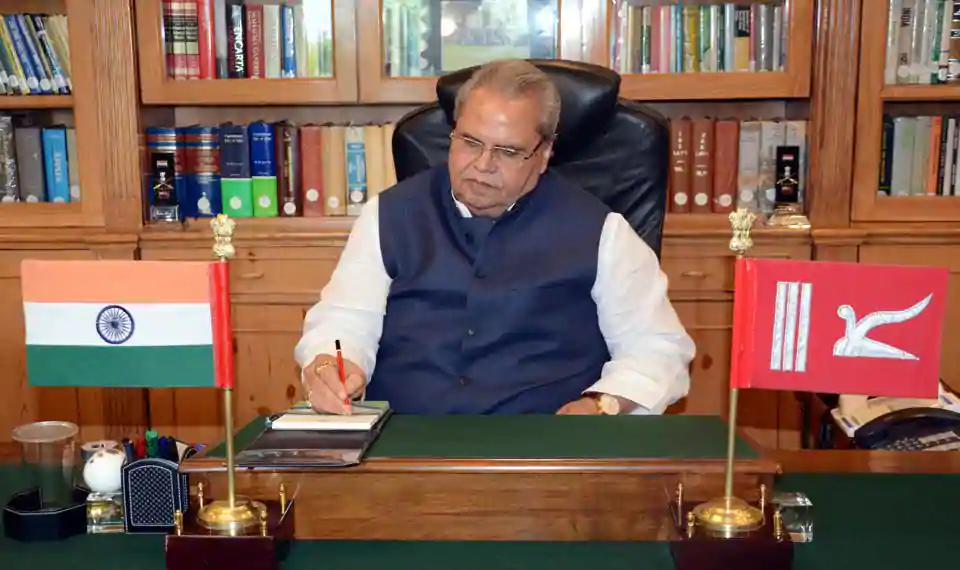Jammu and Kashmir governor Satya Pal Malik has said that former Pakistan President Pervez Musharraf told Kashmiri separatist leaders to get concessions from New Delhi through a dialogue because India was a superpower and he would not be able to break it.
“He [Musharraf] told them he would not be able to change the Line [of Control]. He had told them that neither India nor Pakistan can afford a war and that they should negotiate concessions for Kashmir,” Malik told HT in an interview.
Asked if he was certain that Musharraf had indeed told the Hurriyat Conference that he was not in a position to change the Line of Control (LoC), Malik said, “I am 100% sure. Important people have told me this. Musharraf told the Hurriyat to talk and negotiate agreements that would include free movement for both sides across the Line of Control.”
The governor, who has been in office since August 23 and is the first career politician to be in the job in over five decades, also called on the Hurriyat leaders to “abandon Pakistan’, claiming that “they do not even go to the toilet without Pakistan’s permission”. Pakistan, he added, was a “trouble maker”, not a stakeholder. Jammu & Kashmir has been under Governor’s Rule since June after the Bharatiya Janata Party (BJP) withdrew support from its coalition partner Peoples Democratic Party (PDP).
When asked about Malik’s statement, Hurriyat leader Mirwaiz Umar Farooq said: “Musharraf had discussed the four-point formula that included demilitarisation and free movement across the Line of Control with us.’’ But he dismissed the governor’s statement, saying: “His utterances are part of government of India’s consistent mischief of creating a false narrative on Kashmir in order to undermine its disputed nature.”
What all do New Delhi and the governor want us to abandon, asked the Mirwaiz, adding, “They don’t want us to talk about azadi or autonomy and now they want us to not even talk about Pakistan.”
Significantly, Malik said that the Hurriyat Conference does have some influence in the Valley but added that it is scared of Pakistan and of the terrorists and is thus “caught in a web”. He said the government could talk to them if they took an “independent stand”.
The Narendra Modi government has tried to initiate talks with the separatists through its interlocutor and former Intelligence Bureau chief, Dineshwar Sharma, but they have refused to come to the table. The last time they participated in talks with New Delhi was during the Atal Bihari Vajpayee government.
Backchannel talks during Manmohan Singh’s tenure as PM had led to the ‘four-point formula’ — demilitarisation or phased withdrawal of troops; no change of borders and people of J&K being allowed free movement across the LoC; self-governance without independence; joint supervision mechanism in J&K involving India and Pakistan.
SK Lambah, a former high commissioner to Pakistan and special envoy of Manmohan Singh who conducted secret parleys, said in an interview to HT in 2015 that Pakistan had agreed to ditch its long-held position seeking a Kashmir solution through the implementation of a UN resolution for a referendum, and agreed not to redraw borders during secret negotiations with India in 2007.
He added that leadership on both sides firmed up an agreement but it was not signed because of domestic turmoil in Pakistan that led to Musharraf’s removal. “What we were working on, agreed that there would be no reference to the United Nations resolution or a plebiscite in Kashmir. Both sides agreed that borders cannot be redrawn,” Lambah said in 2015.
Governor Malik has now added to that, saying Musharraf conveyed to the Hurriyat that they should negotiate with India as he would not be able to redraw the LoC.
Former Research and Analysis Wing chief and author of a book on Kashmir, AS Dulat said: “What the governor is saying is correct. Musharraf did tell the Hurriyat that they (Pakistan) had tried everything and that they should come to the negotiating table. Musharraf’s formula led to Manmohan Singh saying that they were close to a breakthrough on Kashmir.”




